Kissing Books: the other "f" word
Every month, Olivia Waite pulls back the covers, revealing the very best in new, and classic, romance. We're extending a hand to you. Won't you take it? You can also peruse the Kissing Books historical archive.
People will tell you romance is anti-feminist. Others will tell you that romance is definitely, strongly feminist. The weird part is: thanks to the genre’s vast and complicated history, both are sort of right. Paradoxes: such fun.
Academic studies of romance during feminism’s second wave argued that the genre upheld the patriarchy by providing glossy ideals of heterosexual marriage to keep the ladies in line. Fictional happy endings were a panacea, a way of soothing the symptoms without actually curing the disease. This theory would seem to explain the existence of wilder, crueler heroes who are often out-and-out rapists: it is generally taken as given that these were more common in early genre romances like The Flame and the Flower, but the culturally inescapable specter of Christian Grey suggests that time here is a flat and sexually aggressive circle. I’ve definitely read books published in the last few years that seem to take great delight in building up the hero’s strength while tearing down the heroine at every turn, and pretending that this was all kinds of feminist and empowering. These anti-heroes are tamed by love – more or less – or else their heroines learn the virtues of resilience and capitulation to forces larger than themselves. The happily ever after here is that the heroine is permitted to survive.
I loathe reading it, but I can’t pretend those books aren’t part of the genre.
Even foundational romances with strong feminist subtexts can be read in less than revolutionary ways. Pride and Prejudice, genre romance’s ur-mother, is clear on the fundamental helplessness of women’s position in the Regency aristocracy but stops short of fomenting outright rebellion; Elizabeth does not overturn the laws of entailment that prevent her and her sisters from inheriting — she only succeeds in winning the Least Worst Dude so her financial future is assured. It is a personal success but not a regime change.
And then there are the other romances, the subversive, outspoken, definitively feminist ones, which author Courtney Milan recently pointed out have just as lengthy a history within the genre. Persuasion, with its adamant defense of women’s fidelity and rejection of male-penned opinions to the contrary. Romance serials in black-owned American newspapers in the 1920s, resisting the oppressive weight of Jim Crow laws and redlining. (Beverly Jenkins once gave a great RWA keynote about the history of black American romance and guess what? You can watch right here.) Queer romance in all its particular flavors, each with its particular history that sometimes leans into and other times away from mainstream New York-published romance. These books have a long lineage — but it is true that they are often harder to find, suppressed or neglected for reasons that you can guess at but which are far too depressing to list here. I believe these stories have been and are always being written; whether or not they’ve been published in significant numbers is the crux of the matter.
In fact, the more types of romance I read, the more it becomes clear that romance has multiple histories rather than one great shared trunk of origin — historical romance has developed in ways very different from the contemporary, to give one broad example, and this only gets more complicated when you start cross-sectioning for variations in race and class and sexuality and geographic background. Romances depend on either reinforcing or playing against cultural norms of courtship etiquette, so when you move from North America to Niger to the Philippines the novels you find show a lot of variation. Which is great! I love seeing how flexible the genre is, how many millions of ways there are to interpret the One Rule (“a happy ending”). Sometimes I get twitterpated thinking about the great subgenres that haven’t even been invented yet. The future is just full of amazing books!
Ultimately, I am less interested in answering the question Is romance feminist? than I am in asking which romances are feminist, and in what ways, and then wondering where I can get my hands on a copy. The short question is a trap, a bad-faith debate that pretends it can magically produce an Approved Authoritative Opinion On What All These Ladies Are Up To. In short, it’s lazy. The second question, though, requires you to engage with a book on its own terms, and bring your personal thoughts and feelings to bear, and then ask about systems of access (is it available in audio book or with text-to-speech? Are there geographic restrictions on the sale? Was this self-published because some Big Five editor told the author they already had “one of those books” on their list this year?) I’ll leap to defend the genre from slander (as we’ve seen) but my main subject is and always will be the specifics of the text. What does this book do well, what does it reinvent, what does it offer and what does it take away?
This month’s books are all about confronting history, both capital-H-History and our characters’ personal pasts. Sometimes the past is a problem. Other times, it’s only our view of the past that needs to change.
Recent Romances:
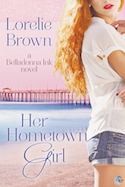
Her Hometown Girl by Lorelei Brown (Riptide Publishing: contemporary f/f):
This is a gorgeous heartbreaker of a book. Cai is a tattoo artist in a California coastal town: long dark hair, tall and edgy, plenty of ink. Adorable, curly-haired, fragile Tansy shows up in her shop in a wedding dress – she’s just caught her fiancée banging the caterer’s (male) assistant, has called off the wedding, and is getting an impulsive lace garter tattooed around her upper calf. The two can’t help but fall into bed – they’re both so needy in different ways, even if they know they’re both struggling to heal – and the sex is playfully kinky and absolutely luscious. That said, much of this book deals with the aftermath of Tansy’s prior relationship, which was intensely abusive, and I will make it clear there’s an on-page rape early in the book. Normally this would send me running for the hills; here, it’s that rare case where the assault is absolutely vital to the story. It makes clear that Tansy’s ex-fiancée was worse than just your stock romance Evil Ex. It makes her struggles to assert herself again so much more meaningful. It really raises the stakes for the kink, since Cai doesn’t know the full extent of what Tansy is struggling with until much later (though she’s figured out the emotional abuse long before). This is a book that knows love doesn’t fix trauma, but recognizes that love is necessary for healing. My only complaint is that the final resolution felt a bit rushed – I’d have liked to have seen more of Cai’s thoughts at the end.
She leans forward another bit and takes a lock of my hair between her fingers. I hate that’s I can’t feel it. I want nerves in my hair so I don’t miss any bit of this woman.
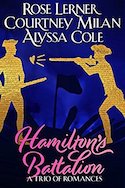
Hamilton’s Battalion by Rose Lerner, Courtney Milan, and Alyssa Cole (self-published: historical m/f, m/m, and f/f)
There are times when superlatives fail and leave only the swear words to carry the point, so believe me when I tell you: this book is so fucking good. I lost count of the times I laughed; I lost count of the times I cried. I went in with the highest possible expectations and I was still completely poleaxed by how vivid the characters were, how brightly the dialogue sparkled, how every page had a line that sliced right through the heart and made me catch my breath. Three of the strongest voices in historical romance poured heart and soul into these stories and it damn well shows.
But it fed my brain as well as my heart, so here are some less sweary thoughts. Every smash hit sparks a flurry of related material, and Lin-Manuel Miranda’s Hamilton is no exception. In addition to all the official secondary material and fan-created works, there are already multiple novels now out depicting Eliza and Alexander’s romance. It’s hard not to feel these inevitably white retellings seriously miss the point: they mistake the subject of the play for the message. Hamilton’s Battalion is a true counterpoint, because like the musical it uses the past not as a changeless artifact, but as a means of reimagining our present and future. These romances are a fierce act of unerasing—Jewish history, queer history, black American history are front and center—and the book does its best to banish the toxic dread that’s kept so many of us frozen in the endless months of this year.
"Andromeda was impulsive, but not wasteful, and something in the way the woman had looked at her screamed loneliness, which was the ultimate waste."
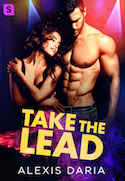
Take the Lead by Alexis Daria (SMP Swerve: contemporary m/f)
Repeat readers will have noticed by now that I love a good high-concept contemporary, and it’s hard to get more high-concept than "lumberjack reality star goes on dancing reality show, falls for pro dancer partner." Fans of The Cutting Edge will want to check out this book for the same hot-spark/long-fuse, opposites-attract, stellar-bickering, manly-man-finds-feminine-art-form-is-actually-super-demanding-and-rewarding kind of catnip. Both Stone and Gina are dealing with some serious family baggage, in addition to the pressures of fame and performance and all the messiness of show business. I was rolling right along, eating up the narrative tension between real and scripted drama, when these words from our hero brought me to a screeching halt: “In the split second that followed, Stone decided not to tell her.” Imagine biting into a huge chocolate chip cookie and finding out those chunks are actually black licorice: the bitter flavor colors everything that follows after. This is a known problem in romance: everyone’s standards for dumpworthy fuck-ups are different, so occasionally you run into a story where no amount of groveling can redeem a character emotionally for you as a reader. (Groveling in romance is very much a technical term.) Gina is a beautifully sympathetic heroine who deserves to have all her dreams come true and I am still just livid that Stone jeopardized that to save himself from being emotionally inconvenienced. Jerk. Though he does do a really gratifying grovel. Whatever. I don’t care. (She said, hitting pre-order on book two.)
Then Gina smiled, and the tension eased. Sometimes he thought her smile was the only real thing in his world.
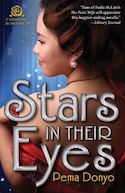
Stars in Their Eyes by Pema Donyo (Crimson Romance: historical m/f)
Romances set in Lost Generation Paris are hopefully growing less rare, because it’s a severely underused setting for glittery, bittersweet, rain-drenched love stories. This swift and slender read is a second-chance romance between an aspiring novelist and a Chinese-American silent-film actress, very light on the sex and heavy on the anguished pining. The prose has the kind of straightforward clarity I usually associate with inspirational or young adult romances—but every now and again those plain sentences resolve into a metaphor so lovely you find yourself breathless: Their breaths fogged together, emitting human smoke into the night air. My god, you could just die. We see more of Gertrude Stein and Alice Toklas than we do of Iris’ family back in LA—though Alice’s cameo is pitch-perfect, and I vastly appreciate the way the hero is in awe of Gertrude as a literary genius and a mentor. It’s not a flawless book; there are a few too many petulant dialogues for my taste, and the plot is a bit simple. But ever since I finished it, I have been unable to stop thinking about rain on the Seine, and a lamplight shining, while a Louis Armstrong song plays in the background. If you have access to a windowseat and a stiff cocktail in a jazz club sometime this winter, this book will match both to perfection.
Iris swung their arms together as they walked, casting a “V” shadow against the sidewalk that reminded him of a bird in flight.
This month’s Medieval Scottish Heroine Made of Pure Honed Steel:
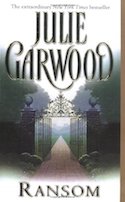
Ransom by Julie Garwood (Pocket Books: Scottish historical m/f)
Julie Garwood was writing scrappy northern girls watching their father get betrayed and beheaded long before George R. R. Martin made the big time. Like Arya Stark, Ransom’s heroine Gillian is profoundly scarred and transformed by having witnessed the brutal slaughter of her family and the wreck of her ancestral home; unlike Arya, Gillian does not close herself off emotionally as a result of the trauma. She may not be an assassin but she is loyal, compassionate, thoughtful, and, oh yes, a stone-cold badass. Completely unafraid of physical pain. Oh, these stab wounds on my arm? The ones that are inflamed and infected? They might slow us down on our cross-country escape, so please do cauterize them with Burny Medieval Mystery Potion, and then we’ll be on our way. Yes, do hold down my arm for the treatment, that’s very helpful, thank you. Pardon me while I go scream a little outside to relieve my feelings, and then we can mount right up and head home. While all the big, tough, musclehead Highland warriors stare at her in awe and fear. At one point the villain strikes her in the face, knocking her to the stone floor; Gillian looks up at him, smiles, and the villain has a panic attack from pure existential terror. She isn’t at all superhuman—she suffers fear and impatience and self-doubt and exhaustion—but beneath all that curling hair is a stubborn streak of pure evil that’s a delight to behold. All the best Garwood heroines are a little evil (my favorite, petite violet-eyed Jamie from The Bride, once punches a horse in the face when it tries to bite her) but Gillian is terrifying enough to fit in any grimdark medieval-set fantasy you could name. Especially since Romancelandia’s Scotland is only slightly less of a made-up world than Westeros—less eager to torture its heroines, of course, but still violent, grimy, and rife with betrayal.
Hesitantly, she placed her hand in his and looked up at him. Embarrassed to see that he was still glowering at her, she smiled sweetly and whispered, “If you do not stop glaring at me, I swear I will kick you soundly. Then you will have something to frown about.”
Upcoming conventions and conferences
Read with Pride Northwest, November 4:
Fans of LGBTQ romance (ahem! points at self) will be thrilled to know there’s a full free day of events planned at the Central Library. Attending authors include James Brock, Austin Chant, Christine Danse, Seattle Review of Books’ own Nisi Shawl, and Rebekah Weatherspoon. The event opens with a two-hour block for NaNoWriMo writing, then splits into panels for sharing book recommendations, craft tips, and a panel on writing queer romance as a political act in troubled times. There’s also a book fair on the fourth floor, and you can bet I’ll be heading straight there with a full month’s book budget in my eager little hands.